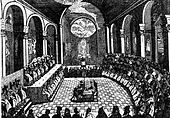| Second Vatican Ecumenical Council Concilium Oecumenicum Vaticanum Secundum (Latin) | |
|---|---|
 Saint Peter's Basilica Venue of the Second Vatican Council | |
| Date | 11 October 1962 – 8 December 1965 |
| Accepted by | Catholic Church |
Previous council | First Vatican Council |
| Convoked by | Pope John XXIII |
| President | Pope John XXIII Pope Paul VI |
| Attendance | up to 2,625[1] |
| Topics | The Church in itself, its sole salvific role as the one, true and complete Christian faith, also in relation to ecumenism among other religions, in relation to the modern world, renewal of consecrated life, liturgical disciplines, etc. |
Documents and statements | Four Constitutions:
Three Declarations:
Nine Decrees:
|
| Chronological list of ecumenical councils | |
| Part of a series on the |
| Ecumenical councils of the Catholic Church |
|---|
 |
| 4th–5th centuries |
| 6th–9th centuries |
| 12th–14th centuries |
| 15th–16th centuries |
| 19th–20th centuries |
|
|
Dei verbum, the Second Vatican Council's Dogmatic Constitution on Divine Revelation, was promulgated by Pope Paul VI on 18 November 1965, following approval by the assembled bishops by a vote of 2,344 to 6. It is one of the principal documents of the Second Vatican Council.
The phrase "Dei verbum" is Latin for "Word of God" and is taken from the first line of the document,[2] as is customary for titles of major Catholic documents.
- ^ Cheney, David M. "Second Vatican Council". Catholic Hierarchy. Retrieved 18 May 2011.
- ^ "Dei verbum". vatican.va (in Latin).